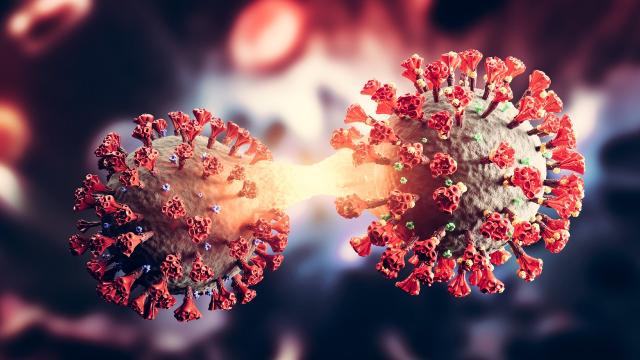We’re into our third year of the pandemic and it’s far from over. We’re in a much better position than we were two years ago thanks to the rollout of vaccines but new variants of COVID-19 continue to emerge, including the latest: Deltacron.
What is Deltacron?
This new variant is a hybrid of two existing strains. If you’ve been following COVID-19 news you’ll likely know of the prevalence of the Delta strain which plunged states into lockdown for months last year.
This was then followed up by Omicron, a less deadly but more transmissible strain of the virus, which caused a massive spike in cases over Christmas and has continued to plague us ever since.
There are two strains of Omicron currently circulating, BA.1 and BA.2, with the latter being the dominant strain right now.
A combination of both the Omicron and Delta strains, which has been dubbed Deltacron, has been detected in countries all around the world since February.
New South Wales Health reported in its weekly COVID-19 data last week that at least one case of the Deltacron strain had been detected in positive case numbers in the past week. Queensland also confirmed a number of cases through genomic sequencing.
The Deltacron variant has emerged through a process of recombination.
In the case of Deltacron, it means someone has been infected with Omicron and Delta variants of COVID at the same time. The variants have then mutated together in the body to form a new variant.
What are the symptoms of Deltacron?
There’s still a lot that is unknown about this new variant of COVID, but researchers seem to believe it is an Omicron variant disguised in the make-up of Delta.
“This is essentially Delta trying to hang on by plagiarising from Omicron,” Jeremy Kamil, associate professor of microbiology and immunology at Louisiana State University Health Shreveport, said via 7 News.
Associate Professor Paul Griffin, speaking to the ABC, seemed to agree that the new variant is acting more like Omicron:
“This is behaving a lot more like Omicron… In some ways, that’s good news, because we know Delta was perhaps more severe in terms of the illness that it caused, but we know that Omicron is likely more infectious,” Dr Griffin said.
Without genomic sequencing, it’s hard to know which strain of the virus you have, but given everything we know about Deltacron so far, it seems like it will present similar symptoms to Omicron.
If you need a reminder of those symptoms they are:
- Runny nose
- Headache
- Fatigue
- Sneezing
- Sore Throat
- Cough
Remember to get tested if you have any symptoms and to remain in isolation until they go away.
Should we be worried?
It’s still very early days for the Deltacron variant, so it’s hard to say whether it will become a problem.
The strain is currently circulating at very low levels around the world, so until we have more data we won’t know whether Deltacron is deadlier or more transmissable. There’s also no evidence as of yet to say whether this variant is more proficient at evading vaccines.
The World Health Organisation has not yet classed it as a variant of concern, so there’s no need to panic just yet.
The best thing we can do in the meantime is to follow the current health advice (i.e. wear your mask) and get vaccinated and boosted when it’s your time to do so.
